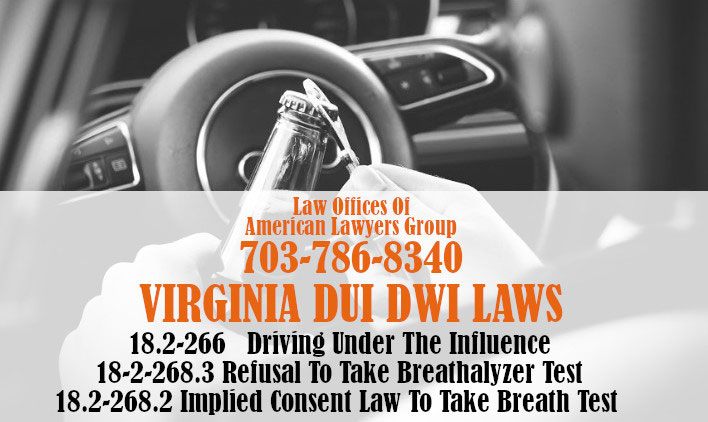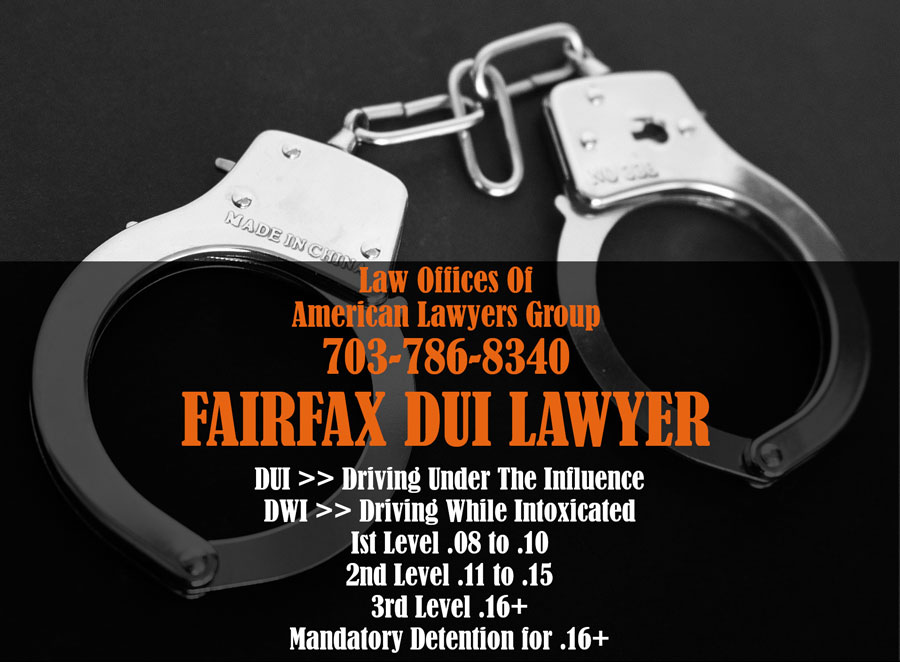VIRGINIA CRIMINAL DUI LAWYERS
Have you been arrested for a DUI/DWI Virginia Code 46.2-266? Don’t worry, our Virginia criminal DUI lawyers are experienced in fighting your DUI charge in court and can defend your legal driving rights.
read below penalties and defenses of DUI charges
Experienced Strong Defense Virginia Criminal DUI Lawyers

Call Now – FREE Consultation
Se Habla Español
What are Some of the DUI Defenses In Virginia
One of the most common defenses for a DUI is challenging the field sobriety test, a breathalyzer test, or a blood test.
These tests play a role in determining how impaired a person was at the time they were driving.
It is always important to know whether proper procedure was used when the test was administered.
Therefore, when challenging a DUI, every fact matters so be sure to give the full story from start to finish, to the Virginia criminal DUI lawyers.
Unlike a breathalyzer or a blood test, a field sobriety test cannot be used to determine your BAC level.
The purpose of the field sobriety test is to determine whether there is probable cause to arrest.
However, anyone can fail a field sobriety test if the administrator (the officer) is not trained or fails to follow proper procedures.
Issues with a breathalyzer are not always 100% foolproof. All breathalyzers must be regularly calibrated and maintained by the department using it.
Our Virginia criminal DUI lawyers may request the maintenance and calibration records to ensure that the machine was in compliance.

Are DUI Breathalyzers Reliable To Get an Accurate Reading of the BAC?
Breathalyzers are sometimes unreliable in calculating a person’s BAC level in a person. As mentioned above, if the department fails to perform regular maintenance on the device it could produce inaccurate results. However, that is not the only reason the results may be inaccurate.
There are certain medical conditions such as diabetes, asthma, and gastroesophageal reflux disease that may alter the results of a breathalyzer.
For instance, diabetics have an elevated level of acetone in their breath that will be treated as higher levels of ethanol when analyzed by a breathalyzer.
Much like the breathalyzer, there are strict procedures that must be followed to administer a blood test.
Things to look out for are retrieval methods and the chain of custody.
Alcohol, when consumed, will not automatically produce a BAC level high enough to be considered above the legal limit.
It’s possible that the BAC level while driving was not above the legal limit.
There is a calculation that will give an estimate of the BAC level prior to the blood or breathalyzer test.
Sometimes the defense of your DUI may hinge upon a constitutional violation.
The following arguments are focused on procedure and subjective facts such as an illegal DUI checkpoint, improper stop or factual disputes in the police report.
Are DUI Checkpoints Permitted in Virginia?
In Virginia, DUI checkpoints are permitted so long as the checkpoint is constitutional.
In order to determine the constitutionality of the checkpoint, the officers must have received permission from a supervisor, established a time and duration, reasonable location, and length and nature of the detention, among other procedural safeguards. This defense is used when the checkpoint was the only reason for the stop.
In order for an officer to stop you, they must have a reasonable suspicion that you violated a law.
This is a low threshold but one that may be challenged in court. The officer must personally observe the violation.
An officer may not pull you over for the sole purpose of checking for license and registration.
Because of the arbitrary nature of what is considered a reasonable suspicion, this argument is not as strong as others.
The observations in a police report may be challenged.
Oftentimes, during a traffic stop only two parties are present: the officer and the driver. In court the officer will report their observations during the stop However, their observations are subjective and it is your word against the officers. It is for the judge to determine the credibility of the arguments made by either party.
What are DUI/DWI Penalties

Virginia Code §18.2-266 states that it is illegal to operate a motor vehicle if you have a blood alcohol concentration (BAC) above .08, are under the influence of alcohol or are under the influence of drugs.
If found guilty, you could be subject to penalties under §18.2-270, including a Class 1 misdemeanor with a mandatory minimum fine of $250.
Furthermore, If your BAC was found to be over .15, but below .20, you may be sentenced to a minimum period of five days in jail, and if over .20, you may serve a minimum of ten days in jail.
If this is not your first DUI offense, the penalties are even more severe.
You could be subject to a felony charge, mandatory minimum fines exceeding $1,000, and longer mandatory jail times.
Your license and vehicle may also be confiscated.
If you are under 21, you are also subject to Virginia Code §18.2-266.1 which defines a BAC of .02-.08 as a violation of the law.
If you are convicted under this statute, you will be denied your license for one year and may face additional fines or community service requirements.
After your DUI conviction, your license will be suspended, but you may be able to obtain a restricted license in order to legally travel to work or school.
In order to obtain a restricted license, you may be required to install an ignition interlock in your car and enroll in the Virginia Alcohol Safety Action Program (VASAP or ASAP).
What Are Ignition Interlock Devices and What Are They Used For?
An ignition interlock device installed in your car requires you to blow into a sensor and register a BAC below .02 in order to start your vehicle.
You may be ordered to install an ignition interlock as a condition of your restricted license. Your results are electronically logged and shared with your VASAP program coordinators.
The ignition interlock system must be used for at least 6 months.
You are responsible for the installation and leasing of a device, which can be performed at private ignition interlock servicing centers.
It is illegal for anyone else to blow into your ignition interlock.
If someone else blows in place of you, tampers with the device, or provides you a vehicle without an interlock, they will be guilty of a class 1 misdemeanor.
VASAP is a program designed to address substance abuse and provide a support system after your DUI/DWI conviction.
VASAP may oversee your ignition interlock usage records, and host mandatory sessions on substance abuse prevention.
You will be responsible for your fees related to your VASAP involvement.
Consequences of a DUI for your Commercial Driver’s License (CDL)
If you have a Virginia Commercial Driver’s License (CDL), you may face greater consequences from a DUI conviction.
If convicted, your license and CDL will be suspended for an amount of time determined by the court.
You may apply for a restricted license, but you will not be able to apply for a restored CDL until your license suspension ends.
If you refuse to submit to a breath test in either your commercial or non-commercial vehicle, you can have your CDL disqualified for one year.
If you obtain two or more DUI-related violations, you may be disqualified for life from obtaining a CDL.
While operating a commercial vehicle, additional alcohol-related laws apply.
If you are found to have a Blood Alcohol Content (BAC) above .04 while driving a commercial vehicle, you will be guilty of a class three misdemeanor and will lose your CDL for at least one year.
If you have any alcohol in your blood while driving a commercial vehicle, even below .04, you can be found guilty of a traffic infraction involving alcohol which could affect your CDL eligibility.
Consequences of an Under-age (Under 21) DUI
Minors under the age of 21 face unique penalties for DUI-related charges under Virginia Code §18.2-266.1.
In addition to general laws surrounding DUI, minors who are found with a Blood Alcohol Content (BAC) between .02 and .08 will be guilty of a Class 1 misdemeanor.
A minor found in violation of this section must forfeit their license for one year, and either pay a fine of at least $500 or perform at least 50 hours of community service.
A minor may have to attend the Virginia Alcohol Safety Action Program (VASAP) as well. It is possible to obtain a restricted license during the suspension period in order to travel to school or work.
What is a (DUI) “Wet Reckless” and What are its Consequences?
“Wet Reckless” refers to a reckless driving charge that may be given as a reduction to an initial DUI charge.
This type of charge entails the full sentences of a reckless driving charge, including a Class 1 misdemeanor, fines, and possible jail time.
Additionally, the involvement of alcohol may increase fines and jail time and will lead to a requirement to attend the Virginia Alcohol Safety Action Program (VASAP).
The court may also suspend your license for a period of up to 6 months, but a restricted license may be obtained.
It is important to note that there is no requirement for the state to give you a reckless driving charge in place of a DUI.
The charge is usually reserved for first-time offenders but is not available in all jurisdictions.
Experienced Strong Defense Virginia Criminal DUI Lawyers

Call Now – FREE Consultation
Se Habla Español

